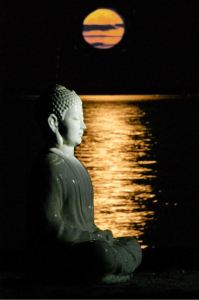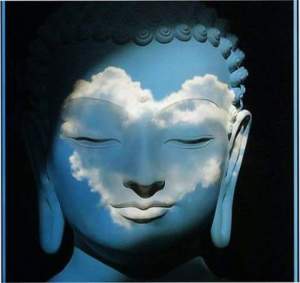
An intelligent person does not blame someone whose mind is always helplessly victimized by faults.
Thinking, “this person’s wrongful conduct is involuntary,” her mercy increases.
—Maitreya, Mahayanasutralamkara


The guru must have pure perception of his own guru and, if possible, of all phenomena. On a more individual level, the guru must have pure perception of his or her students. Pure perception is the foundation of the Vajrayana. Even in the Mahayana, pure perception if the driving force behind working with a disciple. As Lord Maitreya said, a bodhisattva must know that other sentient beings have Buddha nature and that they can be enlightened. So a guru must have confidence that the student’s defilements, no matter how hideous, are temporary; they can be purified and removed. No matter how long it takes, no matter how tedious a job, a guru with a strong view of pure perception will not give up on the student.
– Dzongsar Khyentse Rinpoche

You might spend your whole life in pursuit of only food and clothing, with great effort and without regard for suffering or harmful deeds, but when you die you can’t take even a single thing with you. Consider this well. The clothing and alms needed to keep you alive are all you need. You might dine on the finest meal of delicious meat and alcohol, but it all turns into something impure the very next morning, And there is nothing more to it than that. So be content with life-sustaining provisions and simple clothes, And be a loser when it comes to food, clothing and conversation.
– Chatral Rinpoche
With thanks to Just Dharma Quotes


It is exactly as the omniscient Longchenpa said: When the wise and virtuous are not held in esteem, yet affected and ignorant ones are immensely honored, this is a mark of the degenerate age! When these shallow, ignorant people are respected by others, their arrogance also increases. Like pouring gasoline on a fire, eventually it can only harm others without benefiting themselves.
– Jigme Phuntsok Rinpoche

Our mind is the basis of everything, and from our mind everything arises, Samsara and nirvana, ordinary sentient beings and enlightened ones. Consider the way beings transmigrate in the impure vision of samsara: even though the essence of the mind, the true nature of our mind, is totally pure right from the beginning, nevertheless, because pure mind is temporarily obscured by the impurity of ignorance, there is no self-recognition of our own state. Through this lack of self-recognition arise illusory thoughts and actions created by the passions. Thus various negative karmic causes are accumulated and since their maturation as effects is inevitable, one suffers bitterly, transmigrating in the six states of existence. Thus, not recognizing one’s own state is the cause of transmigration, and through this cause one becomes the slave of illusions and distractions.
– Namkhai Norbu Rinpoche
from the book “The Mirror: Advice on the Presence of Awareness”
ISBN: 978-1886449107 – https://amzn.to/2Qmi3iq
Withthanks to Just Dharma Quotes

Birth, aging, illness, and death: these things are normal. Birth is the normal way of things, aging’s the normal way of things, illness and death are the normal way of things. Get so that you can see clearly that this is the way things normally are. That’s when a sense of disenchantment can arise. You’ll be able to loosen the grip that these things have on you. You’ll be able to pull them out, root and all.
We’ve suffered as the slaves of defilement and craving for how long now? Can you remember? Ask yourself. Can you remember all you’ve been through? And how much longer are you going to let it keep on happening — this holding and carrying and weighing yourself down? How many eons have you been doing this? Tens of thousands, hundreds of thousands of eons. Can you count them all? Of course, you can’t. And how much longer will you have to keep on suffering in this way? If you’re still stubborn, still unwilling to listen to the Buddha’s teachings, this is the kind of reward you’ll have to expect out of life. Do you want it? Do you like it? If you don’t want it, then you’ll have to develop the goodness of your mind so that you can see your way out of this, so that you can see your defilements, so that you can see the suffering and harm they cause.
– Ajahn Fuang Jotiko
With thanks to Just Dharma Quotes

An intelligent person does not blame someone whose mind is always helplessly victimized by faults.
Thinking, “this person’s wrongful conduct is involuntary,” her mercy increases.
—Maitreya, Mahayanasutralamkara

A mind unruffled by the vagaries of fortune, from sorrow freed, from defilements cleansed, from fear liberated — this is the greatest blessing.
– Buddha
Mangala Sutta

The wise know the wrong paths but they relinquish them, they give them up. They are unmoved by pleasure and pain, happiness and suffering. These things arise but those who know don’t cling to them, they let them go according to their nature. This is right view. When one knows this fully there is liberation. Happiness and unhappiness have no meaning
for an Enlightened One.
The Buddha said that the Enlightened Ones were far from defilements. This doesn’t mean that they ran away from defilements, they didn’t run away anywhere. Defilements were there. He compared it to a lotus leaf in a pond of water. The leaf and the water exist together, they are in contact, but the leaf doesn’t become damp. The water is like defilements and the
lotus leaf is the enlightened mind�.
Ajahn Chah
Recent Comments